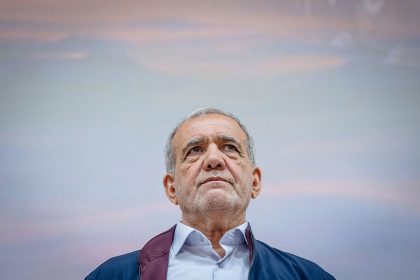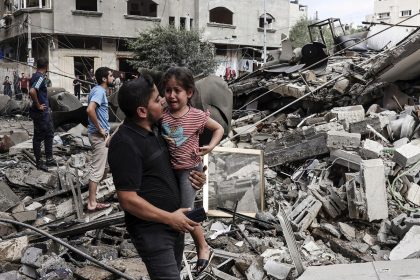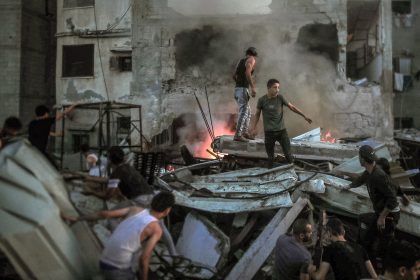For the past two years, while Lebanon has been dealing with a deep economic crisis, a deadly pandemic and a ruinous explosion at Beirut port, its rulers have failed to solve their ongoing power struggle and, if anything, have made matters worse.
In October 2019, thousands of protesters swept the country demanding an end to sectarian politics, incessant backdoor dealing and corruption. None of the demands have been met so far. The failures cast doubt on the assumption behind foreign suggestions around how to solve Lebanon’s multiple crises and receive foreign aid.
Crucially, those who have been in power for the past several years cannot make the necessary changes. As a recent report by the International Crisis Group succinctly put it: “Lebanon’s political leaders are fiddling while the country smolders, threatening a multi-level crisis from which it will be increasingly difficult to recover.â€
Even outside powers who provide humanitarian aid have run into a dilemma. Although they don’t want Lebanon to become a failed state and sink into social unrest, neither do they want to rescue a political class whose track record reflects its inadequacy.
For the past several months, the country’s President Michel Aoun and Prime Minister-designate Saad Hariri have been squabbling over the formation of a new cabinet.
In the meantime, the few efforts aimed at showing that Lebanon is turning a new page have been sabotaged. The investigation into last year’s blast at Beirut’s port – that killed 200 people and damaged large parts of the capital – is a case in point.
Caretaker Interior Minister Mohamed Fehmi rejected the new lead investigator’s request to lift immunity and allow questioning of a senior security official, Major General Abbas Ibrahim.
Victims and survivors of the August 4, 2020, tragedy called Fehmi’s action obstruction. Last Tuesday, demonstrators held hours-long protests outside the minister’s residence.
No one held to account
Adding insult to injury, the following day Aoun insisted the investigation is ongoing and that “there will be no political cover for anyone who was negligent or guilty.†But he stopped short of ordering Ibrahim to be questioned.
Amnesty International complained and urged Lebanese authorities to lift immunity from criminal prosecution from all officials. The organization pointed out that impartial investigations are essential not only for the port case, but for the future of a country with a history of “entrenched impunity†too.
“Lebanese authorities have failed to hold anyone to account for the August 2020 blast,†Amnesty said. “They have also, in effect, been obstructing the course of justice, by claiming immunity rights for high-level officials.â€
The Fehmi scandal was followed by the removal of an investigative judge, Fadi Sawan, who was also looking into the port blast. Sawan was fired by the Court of Cassation after he brought criminal charges against the acting President of the Cabinet and other former ministers.
His removal happened after two ministers, who happen to face criminal charges themselves, filed a complaint with the General Prosecutor requesting Sawan’s removal from the case.
Unsurprisingly, an end to Lebanon’s chronic corruption has been one of the protesters’ persistent demands. Nonetheless, on April 15, Lebanon’s Prosecutor General removed Ghada Aoun, a public prosecutor, from directing investigations into high-profile corruption cases.
Prosecutor Aoun – not related to the president – had charged the governor of Lebanon’s Central Bank, Riad Salameh, with dereliction of duty and breach of trust, and accused former Prime Minister Najib Mikati of “illicit gains†through subsidized housing loans. She had also been issuing arrest warrants in other alleged crimes.
 In the meantime, Hariri has been at odds with Aoun over the size of a new cabinet and distribution of ministries. On Wednesday, Hariri proposed a 24-minister government which – according to local media – provided Aoun eight ministers of his choosing, including the defense and foreign ministries.
Hezbollah’s key role
This would give Aoun a chance to nominate part of the cabinet with the approval of one of his allies, Hezbollah, the Shiite militia and party.
In an interview with Al-Jadeed television, Hariri claimed he selected his candidates based on their expertise and ability to reform the economy.
Hariri, however, asserted the opposite: “I resigned in 2019 because I wanted a government of experts, and if we formed Michel Aoun’s government then the country won’t be saved.â€
Hariri also said Hezbollah, an Iranian-backed group, dominates Aoun and – by extension –Lebanese politics. “The main problem of this country is Michel Aoun, who is allied with Hezbollah, who in turn protects him. This is the equation in the country and if someone can’t see it then they’re blind,†he said.
Aoun accused Hariri of failing to keep faith with the country’s sectarian-based, power-sharing system. In return, Hariri accused Aoun of wanting too large a share of cabinet seats.
Last week, Hariri gave up efforts to form a new government after a months-long deadlock with President Aoun. “I withdrew from forming a government,†Hariri told reporters following a 20-minute meeting with President Aoun at Baabda Palace. “May God save this country.â€
The way things are going, saving Lebanon may indeed take divine intervention. After 21 months of dithering, it’s clear Lebanon’s traditional ruling class is incapable of making fundamental changes.
This was the flaw in last year’s anti-crisis initiative formulated by French President Emmanuel Macron. It relied on a host of failed politicians to fix what ails Lebanon – ending wasteful sectarian politics, ensuring government accountability and weeding out corruption.
To that end, pressure was applied by France, Saudi Arabia and the United States – all of whom have declined to provide fundamental aid until reforms are forthcoming. For its part, the European Union threatened to sanction Lebanese officials who prevent government reforms.
However, sanctioning officialdom leaves ordinary Lebanese in the lurch. Lebanon is suffering an economic depression qualified by the World Bank as one of the most severe in modern history.
Economy in freefall
In fact, according to the latest World Bank’s Lebanon Economic Monitor released in June, Beirut’s economic and financial crisis is likely to rank in the top 10 – possibly the top three – of the world’s most severe crises since the mid-19th century.
The country’s currency has lost more than 90% of its value in less than two years, leading to spiraling poverty and crippling shortages of nearly everything – notably fuel and food.
Images and videos circulating on social media paint a dire picture. Taxi drivers sleep at gas stations, desperate to refuel their cabs. More than three-quarters of women and girls in Lebanon can’t afford menstrual products due to the sharp rise in prices.
Individuals beg for medicines online. “The first case needs 10 boxes,†reads one message. “While the second needs eight. (Written) Prescription available upon request.â€
Just how far can Lebanon fall? Following Hariri’s resignation, the Lebanese pound hit a new all-time-low, exceeding 21,000 to the US dollar. The economy contracted by more than 20% in 2020. More than 55% of the population lives below the poverty line.
Breast-beating from abroad has followed the usual pattern. US Secretary of State Antony Blinken described Hariri’s resignation as a “disappointing development … Leaders in Beirut must urgently put aside partisan differences and form a government that serves the Lebanese people.â€
French Foreign Minister Jean-Yves Le Drian was harsher. “Lebanon is witnessing its self-destruction and the political class is to blame,†he said. “Lebanon’s rulers appear unable to find a solution to the crisis they created.â€
What solution might work? The most plausible yet improvisational solution would be for foreign donors to provide strictly humanitarian aid while awaiting next year’s parliamentary elections. It would at least give the Lebanese people, fed up with their condition, a chance to organize and perhaps elect new leadership.
It may be a narrow window through which to effect wide change, but it is the only window available.
Antonia Williams is a Rome-based journalist and researcher for the Italian Institute for International Studies, which first published this article. She previously worked in Beirut as regional editor for the Daily Star newspaper. In addition to Asia Times, her articles have appeared in the Washington Post, Open Democracy, Huffington Post, the Christian Science Monitor and Beirut Today.












